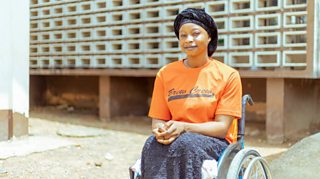Disability is not âinabilityâ: girls making waves in Sierra Leone
Mariama Sesay
Lead Producer, łÉČËÂŰĚł Media Action Sierra Leone
Tagged with:

Madi Sefoi featured as a co-host on our radio show in Sierra Leone
“I sometimes used to sit and cry but then feel determined at the same time to change my situation from what society perceives [about] people living with disability – that we’re not able to do anything in life. Some parents [even] refer to their disabled children as ‘half pikin’ (half child),” Madi Sefoi tells our radio presenter Marian Tina Conteh.
In Sierra Leone, many people live with different forms of disabilities, but often girls in wheelchairs are seen begging from people passing by in cities around the country.
We met Madi on a production visit to the south of Sierra Leone for our radio programme Wae Gyal Pikin Timap (When a Girl Child Stands). Thousands of girls are out of school in Sierra Leone, so the show aims to turn up the volume on the barriers to education. Increasingly, we identify the issues for girls living with disabilities and give them the opportunity to tell their stories on air and discuss challenges.
We sometimes bring girls to our studio to present alongside our presenter, by acting as the presenter’s friend. We interviewed Madi as a co-host when we visited her province to record with our partner radio stations. She told us that growing up in Bo City (known as ‘Gari town’) wasn’t easy,
‘’I had to put up with the difficulties of going to a public school which was not disabled-friendly in terms of moving around the compound. I used to feel discouraged to be crawling among thousands of students.”
People living with disabilities faced lot of discrimination in their daily lives, she said. Often, families, communities, and society see them as a burden. Some people treat them with disrespect and sometimes mock, provoke, laugh, or call them names like ‘gbenkelenkie’ (bend foot), or believe they are a result of witchcraft or are a curse on their family.
“Transport to go to school and other places was always a nightmare for me because I had to be taken off my wheelchair and helped into it again. People look low at me and that makes me feel unhappy,” Madi continues.
She describes that she finished high school and took the West Africa Senior Secondary Certificate Examination (WASSCE) but unfortunately did not achieve the requirements for university. She wanted to re-sit but could not afford the entry fees for the exams.
Determined for change
“I decided to start doing something to raise money to be able to take care of myself and save some to fulfill my dream of re-sitting and going to college or do something meaningful in life,” says Madi.
She started plaiting hair for her family and because she was creative with different hair styles, she quickly had friends, family and new customers coming to see her every day. Her reputation grew, she told us people started calling her ‘Madi Sefoi the Bluffay’ (for us this means a lady who is well presented and immaculate), quickly she started earning enough to start taking care of her immediate needs such as food and clothes, and eventually enough to save for her next step.
After hearing an IT course advertised on the radio, Madi left Bo and traveled to Freetown to complete the course. She continued to plait hair to support herself and enrolled for a customer care training course back in Bo City. “I learned how to attend to people and how to manage my time as well,” says Madi. “With all these training experiences, I continue with my passion of plaiting hair… earning some income that I’m using to take care of myself and my immediate family.”
“Disability is not inability”
On our show, Madi told her story. She said people living with disabilities need people to give them attention, support, and encouragement. People should include girls living with disabilities in opportunities that are available to others – in her words “…our disability is not inability. Girls living with disabilities are greatly in need of those opportunities”.
She went further during her Wae Gyal Pikin Timap interview and called on government to address the issues of people living with disabilities, especially girls, to create more opportunities that are accessible and disabled friendly.
Inviting girls like Madi onto the radio programme helps shine light on the issues girls are facing as part of our project called Every Adolescent Girl Empowered and Resilient (EAGER). We identify issues affecting girls who are out of school, including those living with disability, and give them the opportunity to discuss and tell their stories, and most importantly to share their creative solutions.
Meeting Madi was truly inspirational. She featured in an episode called ‘’Disability not holding girls back’’ and we know by inviting young co-hosts on the show it’s helping other girls. Last year, our research found listeners find the programme engaging and they like Wae Gyal Pikin Tinap because it features girls in relatable, real-life situations about issues relevant to their lives, as well as potential solutions. I believe it is how our programmes focus on inspiring and empowering girls which makes the difference.
--
Mariama Sesay is a Senior Producer for łÉČËÂŰĚł Media Action, Sierra Leone
Learn more about the EAGER project here
Read our new commitment to equity, diversity and inclusion here
